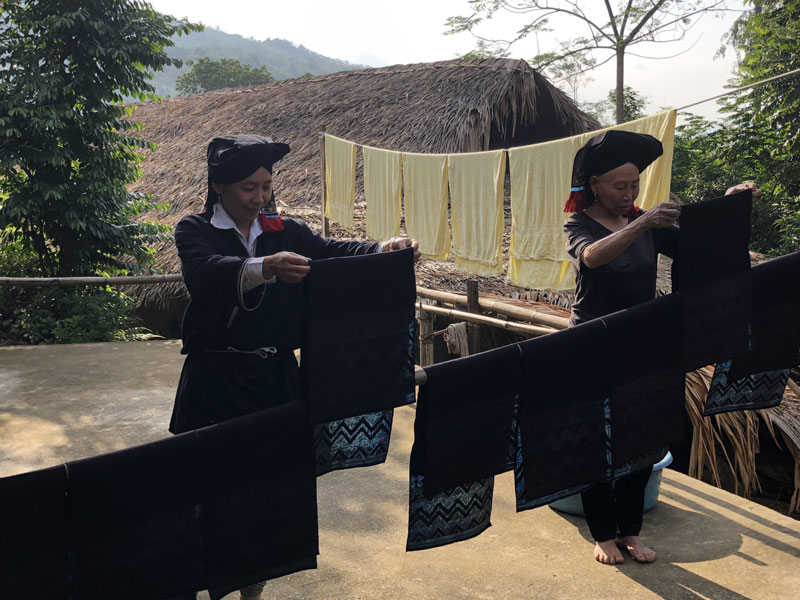


 Dao ethnic women in Sung village, Cao Son commune (Da Bac)
have been keeping their culture in everyday clothes.
Dao ethnic women in Sung village, Cao Son commune (Da Bac)
have been keeping their culture in everyday clothes.
Sung hamlet, Cao Son commune is the village of the Dao Tien people. like in many other hamlets and villages of Dao ethnic people, the people here still keep the habits, the way of eating and living from a long time ago. They live in low-roofed houses with many rooms, the entrance is usually arranged at the head of the house. Regarding costumes, the main color Dao women often choose is indigo and black, embroidered with patterns in the flap.
Dao women's clothing shows gentleness but it is really subtle. In terms of cuisine, the way of preparing dishes of the people is very popular and not sophisticated. The two most memorable specialties are sour meat and Hoang wine. Especially, with the support of AFAP Vietnam, Sung village has transferred its economic structure, developing community tourism in association with preserving national cultural features from 2017 to the present. Exploiting the beauty that the nature bestowed, preserving and promoting the inherent identity of their own group, Sung village has been an attractive destination for foreign tourists to visit and experience.
According to statistics, the Dao community currently accounts for over 20% of the population in Da Bac district, scattered in the communes of Toan Son, Cao Son, Vua Nua, Tan Minh, Doan Ket, Tan Pheo, Nanh Nghe, Tu Ly and the town of Da Bac. The typical culture of the Dao people is expressed in 2 branches: Dao Tien and Dao Quan Chet. Dao Quan Chet live in mainly in Ma village, Tu Ly commune. One of the indispensable cultural features of the Dao Quan Chet people is the Dancing Tet - a custom of naming and celebrating new rice ceremonies in October and November each year.
The conservation and development of the unique cultural features of the Dao people in the district have been paid attention to in recent years. The preservation of Dao cultural identity is also associated with the development of tourism and the local community tourism through the Resolution No.09 of the Da Bac District’s Party Committee, dated on 26 May 2015 on the district’s tourism development by 2020 with a vision to 2030, the project of the District tourism development to 2020 with a vision to 2030 approved by the Provincial People's Committee in Decision No. 1908 / QD-UBND, dated 29/6/2017.
Since 2019, the People's Committee of the district has collaborated with the board of Son Dong of Dao ethnic people in the three provinces including Hoa Binh, Son La and Phu Tho to organize the Spring Festival of Dao ethnic people in Bai hamlet, Cao Son commune. At the same time, this festival is scheduled to be restored every year.
At the end of 2019, the district held a conference on promoting tourism and agricultural investment for the first time. In addition to other ethnic groups, Dao ethnic identity with culture, customs, houses, costumes, folk songs, dances, traditional musical instruments and folk festivals has been introduced and promoted tourists from all over the country and overseas.